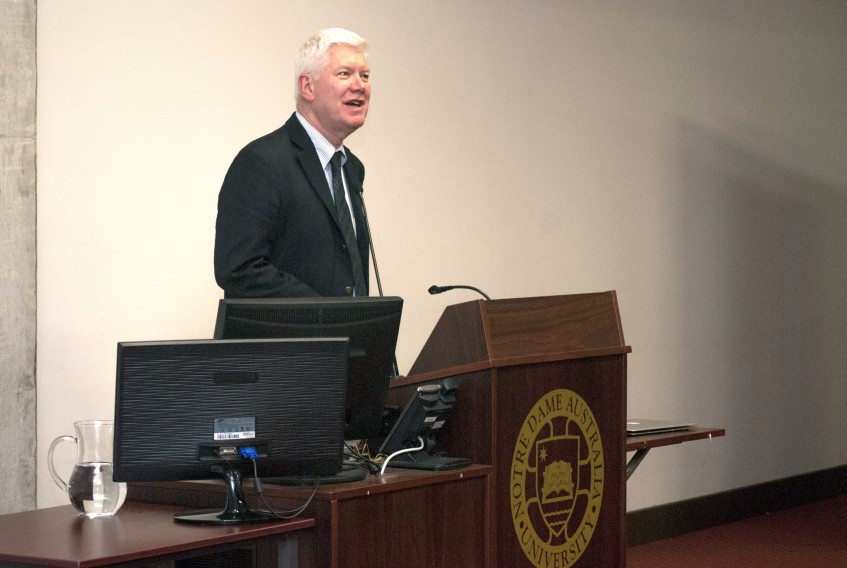Human nature key to tackling diversity: Catholic philosopher

World renowned Catholic philosopher John Haldane addresses the audience during his public lecture, titled Education, Values and the Challenge of Cultural Diversity, at the University of Notre Dame Fremantle. Photo: Rachel Curry.
By Rachel Curry
The challenge posed by cultural diversity can only be overcome be rediscovering our common humanity, Catholic philosopher John Haldane has told a public audience at the University of Notre Dame Fremantle.
A world renowned academic and Papal Advisor to the Vatican, Professor Haldane spoke on the topic of Education, Values and the Challenge of Cultural Diversity in Tannock Hall last Thursday, 19 May.
Originally from Scotland, Mr Haldane is currently teaching a unit within the School of Philosophy and Theology at the University of Notre Dame Sydney and has delivered several public lectures while in Australia, as well as appearing on ABC television and radio.
Professor Haldane began his address by referencing recent controversies in the United States over whether Catholic school teachers should be required to adhere to Church teachings during their private lives.
While condemning the teachers for their inconstancy, he said these issues were emblematic of a wider problem about cultural diversity.
“This issue of a sort of tension between what the Catholic Church, in this case, expects of its members, particularly those who represent it in the role of teachers, and what the wider world or current world may seem to advance, is going to get worse,” he said.
“Where we find ourselves currently, I think, is this: that, very rapidly, we’ve entered into a very charged ideological situation in which there is a very serious contest over values.”
Professor Haldane explained that society had tried to avoid confronting this issue by drawing a series of distinctions, for example between public and private, the procedural and substantial, and the cultural and the moral.
However, the strategy had failed because not everything could be separated in such black and white terms.
The contest over values was not a unique problem to Catholicism, he added, but one that was affecting all sections of society.
“I think the situation we face is one now in which, despite every effort on the part of at least one side in these debates to avoid the argument, the arguments are now unavoidable,” he said.
The way to resolve this, Professor Haldane proposed, was to begin to talk about ourselves as we do everything else in the world – by focusing on our commonalities.
“There’s a kind of narrative that is involved in our understanding of the world in which we build up a picture of the kind of thing something is and we’re very familiar with that; we do it all the time,” he said.
“But what, in a sense, we’ve stopped doing is applying it to ourselves. The challenge of diversity – I mean, in its radical form – is actually a challenge to the very idea that there is something called human nature.
“And part of what I am meaning to try and do is to work again back to the recovery of the notion of human nature because the notion of human nature – a robust understanding of what it is to be human – can then begin to inform again these questions about ‘What is normative?’ or ‘What ought to be normative for human beings?’”
As one of the world’s last remaining institutions that advances the concept of a common humanity, the Catholic Church would have a key role to play in this debate over the next generation, he concluded.
Professor Haldane also addressed several questions from the audience, including the question of why the Church seemed so focused on sexuality.
He replied that the Church had not “chosen the battleground” and was only responding to issues that were arising in society.
He went on to reveal his doubts about the future of Catholic education, in response to a question about whether it is realistic to expect all Catholic school teachers to hold the same views as the Church.
“If you really stand at a remove from Catholic teaching, then you ought not to be a Catholic teacher; it’s as simple as that,” he said.
“So, I think there is a serious crisis in Catholic education, which has been fudged for a very long time… We’re now reaching a point in which there is going to have to be a serious question about whether or not Catholic schooling can continue and whether, for example, they can receive public funding.”
While in Perth, Professor Haldane also presented a lecture for the Dawson Society, titled Holding Fast Through Stormy Waters: Faith, Reason and History.
